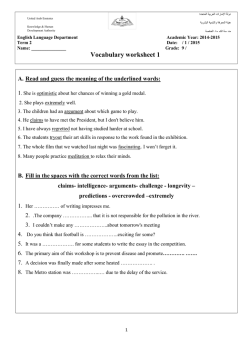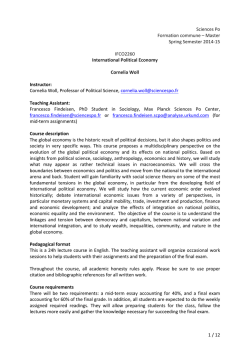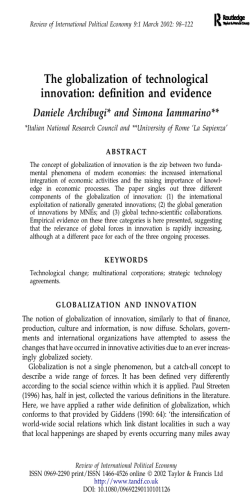
Ps439syl-Spring -2015 - Political Science
PS 439G CONTEMPORARY INTERNATIONAL PROBLEMS: THE POLITICS OF ECONOMIC GLOBALIZATION SPRING 2015 UNIVERSITY OF KENTUCKY PROF. HORACE BARTILOW DEPARTMENT OF POLITICAL SCIENCE A copy of this syllabus is also available from the Political Science Department’s web page. The address is: http://www.as.uky.edu/polisci/ A copy of the syllabus is also included in the course packet that can be purchased at Johnny print, which is located directly across the street from the Gatton School of Business. POL 439G Spring 2015 CONTEMPORARY INTERNATIONAL PROBLEMS: THE POITICS OF ECONOMIC GLOBALIZATION Professor: Horace Bartilow Patterson Office Towers Room 1641 Class Room: CB 247 Class Time: Tuesdays and Thursdays 2 - 3:15pm. Office Hr: Tuesdays and Thursdays 1 – 2pm. PURPOSE AND OBJECTIVE OF COURSE This course examines the major contemporary problems in the International Political Economy (IPE). These relate to the ‘seemingly’ paradoxical patterns of Economic Globalization. Students will be introduced to the various theoretical perspectives that major scholars utilize in an attempt to provide solutions to the problems that Globalization poses for the International Political Economy. The major objective of the course is to challenge students to grapple with the complexity of issues that will be covered and the conflicting perspectives that characterize contemporary research on Globalization. The central questions that the course addresses are: • • • • • • • • • • What explains the patterns of globalization that is emerging in the contemporary IPE? Specifically, what are the various components of globalization and to what extent do they bring into question the very notion of the sovereignty of the nation state? Does globalization promote income inequality, unemployment and weakens the state's ability to pursue and implement needed social reform? Does globalization promote the expansion of illicit trafficking? What effect does globalization have on global prohibition? Does globalization promote ethnic conflict and civil war? What effects does globalization have on democracy around the world? What effects does globalization have on human rights around the world? What effect does globalization have on the political, economic and social rights of women around the world? Does globalization undermine environmental protection? This course will introduce students to the research methodologies of Globalization scholars. Most importantly, this course will teach students HOW to analyze research. To this end the instructor’s lectures will focus on the various theoretical approaches to the study economic globalization as well as the STATISTICAL RESEARCH DESIGNS utilized by these scholars. Students should have a BASIC FOUNDATION IN WORLD POLITICS, ECONOMICS AND STATISTICAL POLITICAL ANALYSIS. Student will be challenged to grapple with the complexity of issues that will be covered and the interactive methodologies that characterize research on this topic. Keeping Up With Current Events You are required to keep up with current events related to issues of Globalization by reading the Washington Post and New York Times on a daily (Monday - Friday) basis. You may do so either by reading the hard copies at the library or by reading the electronic editions on the World Wide Web (http://www.washingtonpost.com/ and http://www.nyt.com). There are many ways to supplement your reading of these newspapers: - Reading other national daily newspapers such as the Los Angeles Times and Wall Street Journal, as well as international papers such as the London Times, Guardian, and Le Monde. - Reading weekly news magazines such as The Economist, Time, Newsweek, and US News and World Report. - Listening to National Public Radio programs such as “Morning Edition,” BBC World Service,” and “All Things Considered” on KUFM 89.1 (for schedule, go to http://www.mtpr.net/). - Watching national nightly and weekly television news programs. On PBS, these include “The News Hour,” “BBC World,” “Charlie Rose,” “NOW,” and “Frontline”. The ABC, CBS, and NBC evening news, as well as ABC’s “Nightline,” can also be helpful. Whenever possible I encourage you to consult these and other additional sources. Please note, however, that they will not substitute for daily reading of the Washington Post and New York Times, which offer the most extensive national and international coverage and largest range of opinion. FORMATT OF EXAMINATIONS Please note that ALL exams will be in the TAKE HOME essay format and the EXAM QUESTIONS AND YOUR ANSWERS will be based SOLELY on the COURSE READING MATERIAL and LECTURE NOTES. A NOTE FOR STUDENTS: THOROUGH READING AND EFFECTIVE ENGAGEMENT WITH THE MATERIAL AND SUBSTANTIVE ISSUES ARE CRITICAL ELEMENTS FOR SUCCESS IN THIS COURSE. If you miss an exam or fail to submit a paper for any other reason you will receive a 0 for the assignment. This will put you at risk of failing the course. How to Effectively Answer Essay Questions On the exams you will be asked to compare and contrast the arguments of various scholars and schools of thought. Doing so requires critical reading skills. To develop and practice these skills, consider the following questions for each item you read: A. Overview 1. What is the central question or problem addressed by the author? 2. What is his or her answer or argument? B. Evaluation of the Argument 1. What is the logic of this answer or argument? What school of thought, if any, does it represent? 2. Can you explain the author's argument? C. Evaluation of the Evidence 1. What evidence does the author use to support his or her argument? 2. Does the evidence support the argument? D. Significance 1. Which of the authors we have read would agree and disagree with this argument, and why? 2. How does this article fit into the themes and arguments developed in lecture? The Criterion for Grading the Essays 100 Superb (A+). Develops an extremely well-written, clear, and convincing argument that answers the question and refers well to readings. 90-99 Excellent (A- through A). Develops a generally well-written, clear, and convincing argument that answers the question and refers well to readings. Omissions or inaccuracies are few and detract little from the overall quality of the argument. 80-89 Good (B- through B+). The argument is generally good and answers the question, but the answer is disorganized, unclear, inaccurate, or unsupported in several important respects -- OR -- The argument is well-written, clear, and convincing but doesn’t fully answer the question or refers to just a few readings. 70-79 Marginal (C- through C+). The answer has numerous shortcomings in organization, clarity, accuracy, or support -- OR -- The argument doesn’t really answer the question AND refers to just one or two readings. 60-69 Completely unacceptable (D- through D+). The answer is very vague, completely wrong, has nothing to do with the question, and/or provides no evidence of reading. ATTENDANCE POLICY The instructor assumes that students who sign up for this class are MATURE, SELFMOTIVATED, VERY EAGER TO LEARN AND SERIOUS ABOUT THEIR EDUCATION. Therefore, based on these sets of assumptions class attendance is NOT MANDATORY. However, IT IS STRONGLY RECCOMENDED THAT YOU DO NOT MISS CLASS BECAUSE THE ISSUES COVERED IN LECTURES AND IN THE READING ARE TECHNICAL, CHALLENGING AND COMPLEX. NOT ATTENDING CLASS REGULARLY AND NOT DOING ALL THE READING WILL RESULT IN EARNING A FAILING GRADE. The instructor will NOT be giving the lecture twice during office hours or PROVIDING LECTURE NOTES to students who miss class WITHOUT DOCUMENTED EXCUSE. In cases where absences are related to university travel the appropriate university letter must accompany travel. Absences that are due to illnesses must be accompanied by a doctor’s proof of illness. The appropriate death certificate must accompany absences that are due to family death. POLICY ON CLASS ROOM BEHAVIOR Because many students abuse the use of laptop computers during class lectures, the University of Kentucky has given faculty the option of BANNING their use during class. This policy will be enforced. Due to their potential for distracting you and your fellow classmates, laptop computers or other devices that can be used to access the Internet are NOT permitted in this class – unless they are used in designated areas approved by the instructor. Moreover, during class, refrain from talking during the lecture (unless it is to ask the instructor a question!), reading a newspaper, doing crosswords, Sudoku or other puzzles/games, sleeping, text messaging or other cell phone use, or listening to your iPod or other .mp3 players. When in class, turn off your cell phones – silencing will not suffice. The instructor reserves the right to dismiss from class any student who violates these policies. Course Requirements The final grade for this course will be based on the following three exams: 1. A mid-term examination will determine 40% of the final grade. 2. An end of term examination will determine 60% of the final grade. REQUIRED TEXTS 1. Robert Z. Lawrence. Single World, Divided Nations? International Trade and the OECD Labor Markets (Brookings Institution Press, 1996) 2. Alison Brysk. Globalization and Human Rights (University of California Press, 2002) 3. Joseph S. Tulchin and Gary Bland (eds). Getting Globalization Right: The Dilemmas of Inequality (Lynne Rienner Publishers, 2005) 4. Moises Naím. Illicit: How Smugglers, traffickers and Copycats are Hijacking the Global Economy (Doubleday, 2005) 5. Coletta A. Youngers and Eileen Rosin. Drugs and Democracy in Latin America (Lynne Rienner, 2005) 6. Additional articles for this course are contained in a complete course packet and can be purchased at Johnny Print, which is located across from the Business and Economic Building. If you choose not to purchase the course packet, you may make copies of the articles form either the instructor or you may secure your copies by finding the appropriate journal in the University’s Young Library. READING SCHEDULE AND TOPICS WEEK ONE (Jan 15 - Jan 20) Globalization and the Sovereignty of the nation state: A Contested Issue. Reading: 1. James H. Mittleman, “The Dynamics of Globalization,” (Reading Packet) 2. Peter F. Drucker, “The Global Economy and the Nation- State,” Foreign Affairs, September/October 1997, pp. 159-171. (Reading Packet) 3. Richard Rosecrane, “The Rise of the Virtual State, Foreign Affairs, Vol. 75, No.4, July/August 1996, pp.45-61 (Reading Packet) WEEK TWO (Jan 22 - Jan 27) Components of Globalization and the lost sovereignty of the nation state: The issues of Trade. Lecture will address the questions: Is trade truly a Global phenomenon? And does it promote unemployment and income inequality within the nation state? Reading: 1. Charles R. Carlisle, “Is the World Ready for Free Trade?” Foreign Affairs (Vol. 75, No. 6, November/December 1996), (Reading Packet) 2. Robert Z. Lawrence. Single World, Divided Nations? (ALL) WEEK THREE (Jan 29 – Feb 3) Is income inequality really an inevitable consequence of Globalization? Reading: 1. Joseph S. Tulchin and Gary Bland (eds). Getting Globalization Right (All) WEEK FOUR (Feb 5 – Feb 10) Components of Globalization and the lost sovereignty of the nation state: The Global Narcotic Industry. Lecture will address the question: Does the globalization of trade and investment both facilitate and propel the global expansion of the illicit narcotic industry? Reading: 1. Moises Naím. Illicit: How Smugglers, traffickers and Copycats are Hijacking the Global Economy (All) 2. Financial Action Task Force Report on Money Laundering Techniques 20022003. (Reading packet) 3. Horace Bartilow and Kihong Eom. 2009. Free Traders and Drug Smugglers: The Effects of Trade Openness on States’ Ability to Combat Drug Trafficking Latin American Politics and Society. Vol. 51, No. 2, (Summer 2009): 117-145 (Reading Packet) WEEK FIVE (Feb 12 – Feb 17) Components of Globalization and the lost sovereignty of the nation state: Globalization and Global Prohibition: Drug Trafficking (Part One) Reading: 1. Horace Bartilow and Kihong Eom. Shirkers and Drug Runners: The limits of US-bilateral counter-narcotics cooperation in the Caribbean Basin, National Political Science Review. Vol. 14, 2012: 57-77. 2. Coletta A. Youngers and Eileen Rosin. Drugs and Democracy in Latin America (read especially Chapters 1, 2, 4, 5, 6, 7, 8, 10) 3. Horace Bartilow and Kihong Eom. Busting Drugs While Paying With Crime: The collateral damage of US drug enforcement in foreign countries, Foreign Policy Analysis. Vol. 5, No. 2, April 2009: 1-24. (Reading Packet) MID TERM TAKE HOME EXAMINATION TUESDAY FEBRUARY 17TH. THE EXAMINATION WILL COVER THE READINGS AND LECTRES FOR WEEKS 1, 2, 3, 4, & 5. THE EXAM IS DUE CLASS TIME TUESDAY FEBRUARY 24TH. WEEK SIX (Feb 24 - Feb 26) Components of Globalization and the lost sovereignty of the nation state: Globalization and Global Prohibition: Sex Trafficking (Part Two) Reading: 1. The Department of State. Trafficking in Persons Report, June 2007. (Reading Packet) WEEK SEVEN (Mar 3 – Mar 5) Components of Globalization and the lost sovereignty of the nation state: The spread of civil and ethnic conflict. Does economic globalization fuel the rise of ethnic nationalism, secessionist movements and civil war? Reading: 1. Gary Becker, “Why so many mice are roaring” Business Week, Vol. 7, November 1994. (Reading packet) 2. Katherine Barbieri and Rafael Reuveny, “Economic Globalization and Civil War” Journal of Politics, Vol. 13. No. 3, 2005. (Reading packet) WEEK EIGHT (Mar 10 – Mar 12) The implications of Globalization for democracy: In what ways and to what extent, does globalization undermine or strengthens democracy? Reading: 1. Quan Li and Rafael Reuveny, “Economic Globalization and Democracy: An Empirical Analysis” British Journal of Political Science, Vol. 33. Part. 1, January 2003. (Reading Packet) WEEK NINE (March 17-22) SPRING BREAK WEEK TEN (Mar 24 – April 2) The implications of Globalization for Human Rights: In what ways and to what extent, does globalization undermine or strengthens Human Rights? Reading: 1. Alison Brysk. Globalization and Human Rights (All) WEEK ELEVEN (April 7 – April 14) The implications of Globalization for the Status of Women: In what ways and to what extent, does globalization undermine or strengthens the political, economic, and social rights of women? Reading: 1. David L. Richards and Ronald Gelleny, ”Women Status and Economic Globalization” International Studies Quarterly, Vol. 51, Number 4, 2007. (Reading Packet) 2. Mahmood Monshipouri, Claude E. Welch Jr, and Evans T, Kennedy, “Multinational Corporations and Ethics of Responsibility: Problems and Possibilities”, Human Rights Quarterly Vol. 25, No.4, 2003. (Reading Packet) WEEK TWELVE (April 16 – April 21) The implications of Globalization for the environment: In what ways and to what extent, does globalization undermine or strengthen environmental protection? Reading: 1. Ka Zeng and Josh Eastin, “International Economic Integration and Environmental Protection: the Case of China”, International Studies Quarterly Vol. 51, Number 4, 2007. (Reading Packet) WEEK THIRTEEN (April 23) REVIEW END OF TERM EXAMINATION WILL BE HANDED OUT THURSDAY APRIL 14. THE EXAMINATION WILL COVER THE READINGS AND LECTRES FOR WEEKS 6,7,8,10,11, &12. THE EXAM WILL BE DUE ON WEDNESDAY MAY 6 AT 3:30pm IN OUR REGULAR CLASS ROOOM CB 247– THE TIME THIS IS SCHEDULED FOR THIS EXAM.
© Copyright 2026



